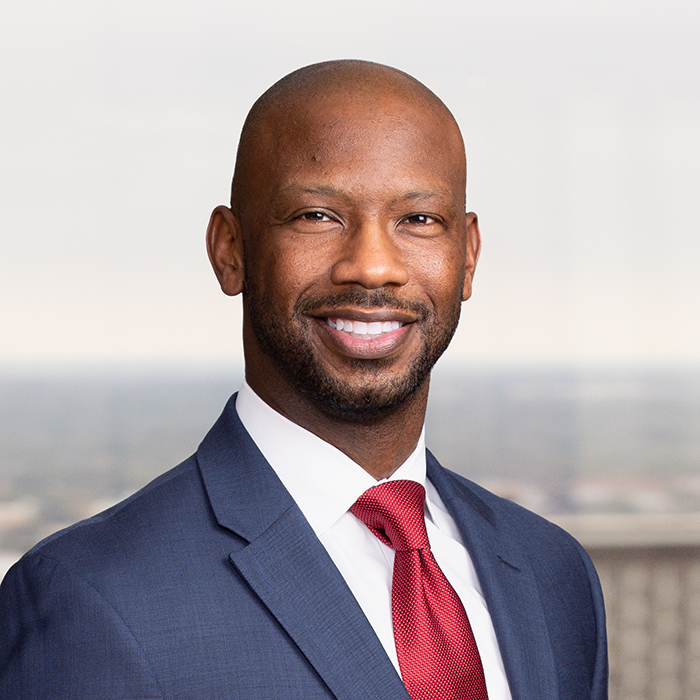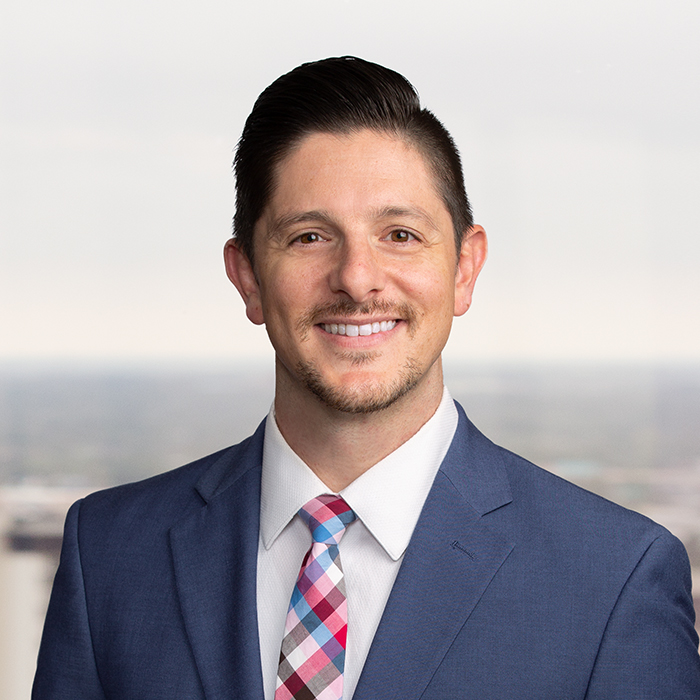In this episode, San Antonio attorneys Roderick Faulk and Brian Pettis discuss their military service and the profound impact the U.S. Air Force has had on shaping their legal careers, as well as how they are using their experience to help fellow veteran business owners succeed.
Featured This Episode
Our Host: |
||
 Courtney White Courtney WhiteResearch Attorney, Dallas & Houston Follow on LinkedIn » Instagram: @courthousecouture |
||
Episode Guests: |
||
 Roderick Faulk Roderick FaulkAssociate, San Antonio Follow on LinkedIn » |
 Brian Pettis Brian PettisAssociate, San Antonio Follow on LinkedIn » |
|
Episode Transcription
Courtney White: Hi, everyone. I am Courtney White, and this is Jackson Walker Fast Takes. Here at Jackson Walker, we are extremely proud of our veterans and want to celebrate their service to our country and their leadership that has helped shape our firm into what it is today. I asked two of my colleagues to join this podcast to share more on their service to our country and how those experiences have shaped their legal practice here at Jackson Walker. Roderick Faulk and Brian Pettis are associates in the Corporate & Securities practice of Jackson Walker’s San Antonio office.
Roderick and Brian, thank you for joining the podcast with me today.
Roderick Faulk: Thank you for having us, Courtney.
Courtney White: I’m so excited to have both of you here and learn a little bit more about you. So, I’d love to just start with this question first: What branch of the military did you serve in, and how long did you serve? Brian, would you go first?
Brian Pettis: Sure, I was in the United States Air Force, and I was in for four years active duty, three years active reserves, but came back to active duty for a while during that period.
Courtney White: And Roderick?
Roderick Faulk: Certainly. So, I attended the United States Air Force Academy. After my four years at the Academy, I served in the Air Force for approximately six years total, five of those at Langley Air Force Base in Virginia, while active duty and one on reserve at Maxwell Air Force Base in Alabama.
Courtney White: Awesome. What did you do in the military, and what skills did you develop? Roderick, I’d love if you take this question first.
Roderick Faulk: Sure. While in the Air Force, I served as a Cyber Operations Specialist. There are several skills that I learned and honed while in the Air Force, but probably the most important of these are leadership, time management, teamwork – even beyond what I have learned playing sports my entire life – problem solving under pressure, and attention to detail.
Courtney White: Brian, same question, would love to hear your answer.
Brian Pettis: For me, I was always on the enlisted side. I was an Airborne Cryptologic Linguist. It was an extremely exciting, rewarding job. Lots of great training. Leadership was still a key component, like Roderick said, for us as well. Working as a team, we flew an aircraft that had numerous individuals, and there was constant communication. So, it was teamwork, but really, there was a ton of emphasis on the communication, whether it was conveyance of information. In our case, we spoke four languages. So, that was pretty key for us. And just dealing with that adversity, and that pressure and the time constraints, and really being comfortable being uncomfortable. It’s a phrase that a lot of folks in the military have heard before. A lot of that I got from the different schools I went through. It was pretty key to shaping not only who I am, but my ability to take those skills and apply them to different areas of life.
Courtney White: I’d love to know how your skills from your work in the military transfer to the work you do today. It sounds like both of you developed some really unique and pretty interesting skills. So, I’d love to hear from Brian – how did those skills transfer to your work today?
Brian Pettis: I think from the leadership standpoint, it’s about being able to, as an attorney, step into that role and help lead the deal that might be going on for the client or takeover that matter, because they’re coming to you and they’re looking for that help, right, and they need to see somebody that gives them that sense of, ‘Hey, I got you, we’re going to take care of this, everything’s going to be okay.’ Being able to do that and gather individuals to help get the best result for the client is hugely important. That’s that teamwork aspect. But then, of course, adversity, pressure, communication, those are things that we have to deal with on a regular basis, whether it’s the pressure of the moment in negotiation, communicating clearly with our clients or opposing counsel. So, all those things kind of come together and you have to be comfortable taking on those challenges, because you don’t know what’s going to happen in any deal – they’re all unique – or any litigation matters. So, I think that’s where those skill sets transfer over.
Courtney White: Thank you for sharing that. Roderick, same question, love to hear about how the skills you developed, how they transfer into the work that you do?
Roderick Faulk: Yeah, I echo many of the sentiments that Brian just expressed. One of the things he said that really stood out is getting comfortable being uncomfortable, right? One of my favorite areas of corporate law is mergers and acquisitions. So, you’re typically working in a variety of areas of business. Typically, we’re learning a lot about the deal. So, the deal structure, we’re learning about the buyer or the seller. There are several moving parts in every deal. The ability to adapt while you’re uncomfortable to quickly understand, whether that’s understanding the parts of the deal, understanding what’s important to the buyers and the sellers. So, again, I would say being comfortable with being uncomfortable, being able to quickly adapt, those are two very key skills to develop. Then, last, I’d probably say just being curious, because, as you both know, being attorneys, the legal pitfalls are not always immediately illuminated, right? So, as attorneys, we’re always asking questions to find out more so that we can get to a result that is best for our client.
Courtney White: Thank you for offering that great perspective and your unique experience. Your service to our country is, of course, very appreciated. But, honestly, both of you take that seriously, and I know that you all are working to support other veterans. So, I’d love to hear a little bit more about that. Roderick, would you take this question first for me?
Roderick Faulk: Sure. So, Brian, myself, and another attorney here in our San Antonio office, Daniel Maldonado, all three of us are veterans and assisting companies that are either founded by veterans or led by veterans. That topic is very important to us. We understand the significance of those companies to our communities and, really, every community. So, our goal is to assist those companies in elevating their value in their respective markets, at the beginning stages of the plan. The goal is to reach out to those businesses in the community, assess their needs, and figure out where we can assist them from a legal perspective.
Courtney White: I also know, Roderick, you’re working internally to network with other veterans who work at Jackson Walker. Would you talk a little bit more about that, as well?
Roderick Faulk: I am. Through creating this Jackson Walker affinity group, we actually discovered there are quite a few. Before we started doing the research, we weren’t quite sure. Like I said, there’s three of us here in the San Antonio office, but as we looked over all the different offices, there’s probably 14, 15 veterans in Jackson Walker totally. So, another surprising thing about that is all 15 of those individuals span the gamut of the different legal practices that we can offer, for instance, to a veteran-owned company, whether that’s corporate and securities, creating a fund, IP protection. So, the reason why that’s important is not only can we offer from a legal perspective things that would be of value to those companies, but as veterans, we also understand kind of their mindset in building their companies. I think being a veteran, having served in the armed forces, we all have a similar way of doing things.
Brian Pettis: And the communication, right? Because, back to that, we all kind of understand not only how to communicate with each other, but even it’s the unsaid thing—it’s the unspoken context. I think that there’s just a certain level of commitment and loyalty that we all have to each other, and I think that it rings true if you know a veteran company says, ‘Hey, you know, I’d love to work with folks who have combat similar background.’ They understand what they’re getting, right? We can put together, like Roderick said, a complete team if we needed to have just veterans who could handle all their needs and to understand how we operate, how we communicate. It’s a really important cultural dynamic that brings a level of diversity here at Jackson Walker to the next level, as well. I think that’s something that’s also really key to what we got going on here.
Courtney White: Well, I loved hearing more about your service and how you all are using your unique experiences to benefit the client, but also to develop the unique culture we have here at Jackson Walker. So, Roderick and Brian, thank you so much for your service to our country. Thank you for coming on to the podcast today.
Roderick Faulk: Thanks for having us.
Brian Pettis: Thanks, Courtney. Been a pleasure.
For additional JW Fast Takes podcasts and webinars, visit JW.com/Fast. Follow Jackson Walker LLP on LinkedIn, Twitter, Facebook, and Instagram.
The music is by Eve Searls.
The opinions expressed do not necessarily reflect the views of the firm, its clients, or any of its or their respective affiliates. This article is for informational purposes only and does not constitute legal advice.
 Meet Roderick
Meet Roderick
Roderick Faulk is an attorney in the Corporate & Securities practice of Jackson Walker’s San Antonio office. Roderick partners with individuals and institutions in the areas of real estate, technology, fintech, open-source software, and life sciences to handle a variety of matters, including corporate formation and structuring, business strategy, capital raising, mergers and acquisitions, and intellectual property. Prior to Jackson Walker, Roderick practiced at an international law firm and a firm that provides venture counsel in Silicon Valley. In addition, he previously held other notable positions in various industries throughout his career, including previous service in the United States Air Force as an active-duty officer focused on cyber operations and information technology.
 Meet Brian
Meet Brian
Brian Pettis is a corporate, securities, and private investment funds attorney, licensed in both California and Texas. Brian advises public and private companies, investors, issuers, sponsors, and underwriters in connection with mergers and acquisitions, initial public offerings, startups, and private investment funds. He also has experience as outside general counsel for small companies and family offices, and in the migration of companies from California to Texas. Brian’s clients span many industries, including technology and real estate, and many locations throughout the U.S. and abroad. Prior to Jackson Walker, Brian served in the United States Air Force as an Airborne Cryptologic Linguist and was a police detective and field training officer for the San Jose Police Department.
 Meet Roderick
Meet Roderick